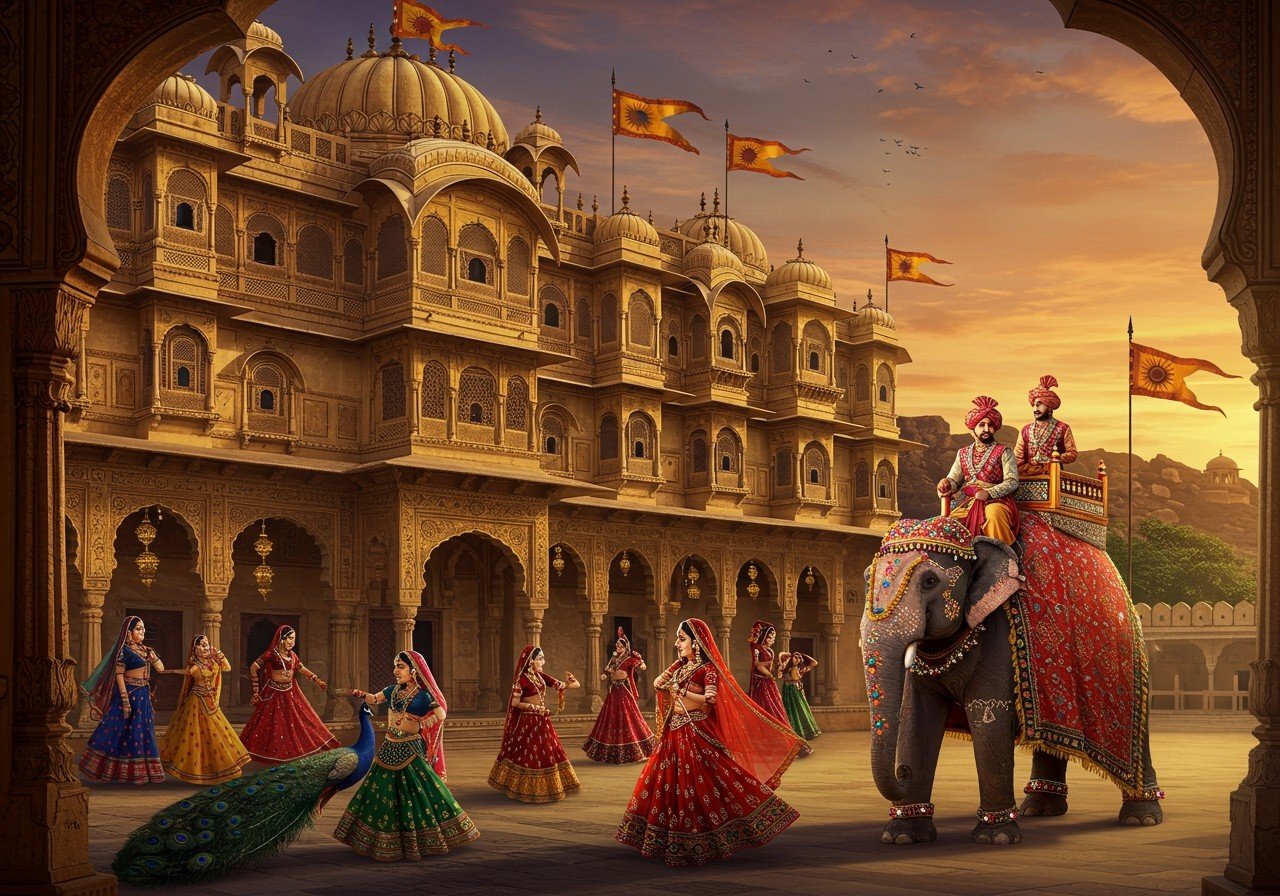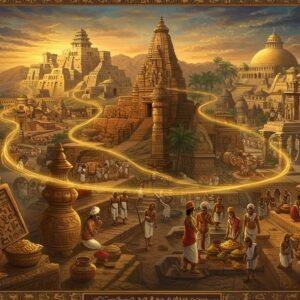
Rajasthan, the “Land of Kings,” is a captivating state in Northern India, renowned for its rich history, vibrant culture, and magnificent architectural marvels. The legacy of the Rajputana dynasty is deeply woven into the fabric of its majestic forts, opulent palaces, and time-honored traditions. This comprehensive guide is crafted for culturally curious travelers, offering an in-depth exploration of Rajasthan’s historical sites and cultural nuances, providing a profound understanding of the state’s captivating legacy.
History of Rajasthan Forts
Historical Significance of Rajasthan’s Forts
Rajasthan’s forts stand as imposing testaments to the architectural ingenuity and strategic brilliance of the Rajput rulers. Iconic forts like Chittorgarh, Mehrangarh, and Kumbhalgarh exemplify remarkable construction techniques and materials. These fortresses played pivotal roles in defense strategies and shaped the course of political history. Key events, including battles and sieges, are indelibly etched into their stones, adding layers of historical significance. Legends and folklore surrounding these structures further enhance their mystique, while cultural symbolism and rituals performed within their walls highlight their profound cultural importance. Preservation efforts face ongoing challenges in maintaining these invaluable historical sites for future generations.
Visiting Rajasthan’s Forts
Tourists from around the globe visit these forts to experience their grandeur firsthand. Here are some essential tips for visitors:
- Wear comfortable shoes: Extensive walking is involved in exploring these expansive forts.
- Stay hydrated: Carry water bottles, especially during warmer months.
- Respect local customs: Dress modestly and be mindful of local traditions.
- Optimal visiting times: Early morning or late afternoon offer pleasant weather and fewer crowds.
History of Bhangarh Fort
Origins and Legends of Bhangarh Fort
Shrouded in mystery, Bhangarh Fort, often called the “most haunted place in India,” boasts a captivating history intertwined with intriguing legends. Constructed by Raja Madho Singh in the 17th century, it is linked to tales like the curse of the wizard Singhia and his ill-fated love for Princess Ratnavati. The fort’s unique architectural features and design elements add to its allure. The reasons behind its abandonment and the chilling tales associated with it contribute to its haunted reputation. Archaeological findings offer glimpses into its past, while the cultural impact and local beliefs surrounding Bhangarh Fort remain significant.
Practical Information for Visitors
Visitors to Bhangarh Fort should heed these safety precautions:
- Avoid venturing after sunset: Local regulations prohibit entry after dark.
- Safety in numbers: Explore the fort in groups for added security.
- Respect local beliefs: Be mindful of the cultural sensitivities associated with the site.
Daylight hours are the recommended time for visiting.
History and Culture of Rajasthan
Rajput Clans and Cultural Identity
The Rajput clans have indelibly shaped Rajasthan’s history and cultural identity. Traditional attire, such as the majestic turbans and elegant lehengas, holds deep cultural significance. Art forms like miniature paintings and folk dances like Ghoomar are integral to the state’s rich heritage. Festivals like Diwali and Holi are celebrated with great fervor, showcasing Rajasthan’s vibrant cultural tapestry. The state’s culinary heritage is equally noteworthy, with dishes like Dal Baati Churma and Laal Maas tantalizing taste buds with their unique flavors. Religion and spirituality play a central role in Rajasthan, with temples and rituals forming an essential part of daily life. Tourism plays a crucial role in preserving and promoting Rajasthan’s cultural heritage, making it accessible to people worldwide.
Architectural Marvels
Rajasthan boasts a breathtaking array of architectural wonders, each a testament to the artistic brilliance of bygone eras. The City Palaces in Jaipur and Udaipur exemplify intricate designs and exquisite artistic details. Jaisalmer’s havelis, with their ornate carvings, hold immense historical significance. Stepwells like Chand Baori showcase the ingenuity of ancient engineering skills, while Amber Fort embodies a harmonious blend of Mughal and Rajput architectural styles. Temples such as the Dilwara Temples stand as masterpieces of craftsmanship. Preserving these architectural marvels is a continuous challenge, yet essential for safeguarding Rajasthan’s rich heritage. Tourists are encouraged to explore these sites to appreciate their beauty and historical value.
Cultural Traditions and Rituals
Rajasthan’s culture is a vibrant tapestry of traditions and rituals passed down through generations. Traditional music instruments like the Sarangi and Pungi play a vital role in the state’s cultural life. Puppetry, a cherished art form, preserves folklore through engaging storytelling. Camel and elephant festivals showcase Rajasthan’s animal husbandry traditions. Rajasthani weddings are elaborate affairs, with customs and attire reflecting deep-rooted traditions. Crafts like block printing and pottery contribute significantly to the state’s cultural economy. While modern influences are gradually adapting traditional practices, the essence of Rajasthan’s cultural heritage remains strong.
Visitors can immerse themselves in these cultural traditions by participating in local events and ceremonies.
Local Cuisine
Rajasthan’s cuisine is a delightful symphony of flavors and spices. Iconic dishes like Dal Baati Churma, Gatte ki Sabzi, and Laal Maas are culinary must-tries. Sweets like Ghewar and Mawa Kachori add a touch of sweetness to the gastronomic experience. Spices such as red chili and asafoetida enhance the flavors of Rajasthani dishes. Traditional cooking methods, including clay ovens and slow cooking techniques, preserve the authenticity of the food. Food holds deep cultural significance in Rajasthani festivals and rituals. Regional variations, such as Marwari and Mewari food traditions, contribute to the diversity of the cuisine.
Tourists can savor authentic Rajasthani cuisine at local eateries and food festivals.
Plan Your Trip to Rajasthan with Poojn.in
Poojn.in, India’s largest cultural goods and services store, offers a wide range of products to enhance your Rajasthan experience. Find traditional attire, handcrafted artifacts, religious items, and more to connect with the state’s rich culture. Plan your trip between December and March for the best weather and explore popular cities like Jaipur, Udaipur, Jodhpur, and Osian. Poojn.in provides convenient online booking for puja services, ensuring a seamless spiritual journey. Explore the Pitambara Peeth, Ram Raja Temple, and Kandariya Mahadeva Temple for a deeper understanding of Rajasthan’s spiritual heritage.
Enhance your spiritual journey with authentic puja items from Poojn.in. Shop now for Dasha Mrittika and Sapta Jal to elevate your puja experience.
Embracing Rajasthan’s Legacy
Exploring Rajasthan is a journey through time, immersing you in a world of history, culture, and culinary delights. Every fort, palace, and dish narrates a unique story, connecting visitors to the state’s rich legacy. From the valor of the Rajput rulers to the enigmatic tales of Bhangarh Fort, the vibrant festivals, and the delectable cuisine, Rajasthan offers a timeless experience that will create unforgettable memories.


